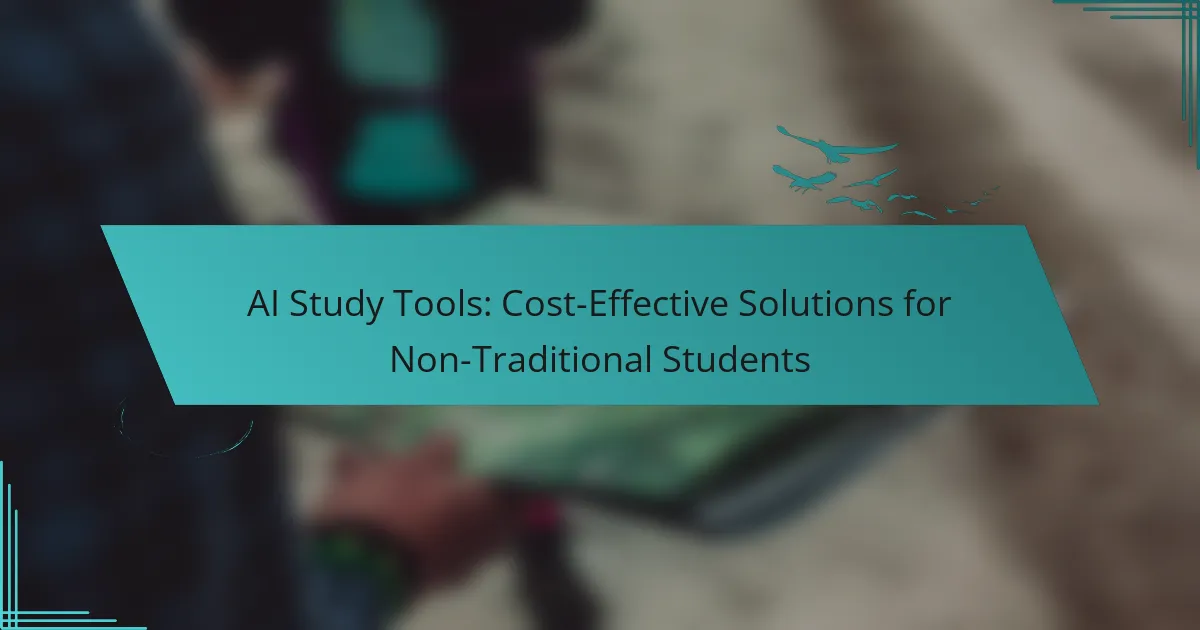AI study tools offer non-traditional students innovative and cost-effective solutions to enhance their learning experience. By accommodating various learning styles and schedules, these tools make education more accessible for those juggling multiple responsibilities. With personalized features and efficient resource organization, they help students grasp concepts more effectively while staying within budget.

What Are the Best AI Study Tools for Non-Traditional Students?
The best AI study tools for non-traditional students enhance learning efficiency and accessibility. These tools cater to diverse learning styles and schedules, making education more manageable for those balancing work, family, or other commitments.
Grammarly
Grammarly is an AI-powered writing assistant that helps users improve their writing skills. It checks for grammar, punctuation, and style errors, providing suggestions to enhance clarity and engagement.
Non-traditional students can benefit from Grammarly’s real-time feedback, which is especially useful for writing essays or reports. The free version covers basic grammar checks, while the premium version offers advanced features like tone detection and plagiarism checks.
Quizlet
Quizlet is a versatile study tool that allows users to create and share flashcards and study sets. It employs AI to adapt learning experiences based on user performance, making studying more efficient.
Students can use Quizlet for various subjects, creating personalized study materials or accessing millions of existing sets. The platform’s interactive games and quizzes help reinforce knowledge, making it ideal for non-traditional learners with limited study time.
Coursera
Coursera offers online courses from top universities and organizations, often featuring AI-driven personalized learning paths. Non-traditional students can access a wide range of subjects, from computer science to humanities, at their own pace.
Many courses are free to audit, with optional paid certificates. This flexibility allows students to balance their education with other responsibilities, making it a cost-effective solution for lifelong learning.
Notion
Notion is an all-in-one workspace that combines note-taking, task management, and collaboration tools. Its AI features help users organize their study materials and streamline project management.
Non-traditional students can create customized databases for tracking assignments, notes, and resources. The intuitive interface allows for easy integration of multimedia content, enhancing the learning experience.
Evernote
Evernote is a powerful note-taking app that uses AI to help users organize and retrieve information efficiently. It allows for text, audio, and image notes, making it suitable for various learning styles.
Students can categorize notes with tags and notebooks, ensuring easy access to study materials. The web clipper feature also allows users to save articles and research directly from the internet, streamlining the study process.

How Do AI Study Tools Enhance Learning?
AI study tools enhance learning by providing personalized experiences that adapt to individual needs, enabling students to grasp concepts more effectively. These tools leverage data and algorithms to create tailored learning paths, offer instant feedback, and organize resources efficiently.
Personalized Learning Paths
Personalized learning paths allow students to engage with material that matches their unique learning styles and paces. AI algorithms analyze a student’s performance and preferences, adjusting the curriculum accordingly to focus on areas needing improvement.
For example, a student struggling with math concepts may receive additional practice problems and resources specifically targeting those areas, while excelling students can advance more quickly. This tailored approach can significantly enhance understanding and retention of information.
Instant Feedback Mechanisms
Instant feedback mechanisms provide immediate responses to student inputs, helping them identify mistakes and correct misunderstandings in real-time. This feature is crucial for reinforcing learning, as it allows students to address errors promptly rather than waiting for traditional grading.
Many AI tools offer quizzes and interactive exercises that provide instant scores and explanations, enabling students to learn from their mistakes effectively. This immediate reinforcement can lead to improved performance and confidence in their abilities.
Resource Organization
AI study tools help organize resources by curating content based on relevance and accessibility. This organization can include categorizing study materials, notes, and practice exercises, making it easier for students to find what they need when they need it.
For instance, a student can quickly access a library of videos, articles, and quizzes related to a specific topic, streamlining their study process. Effective resource organization reduces the time spent searching for materials, allowing more focus on learning and comprehension.

What Is the Cost of AI Study Tools?
The cost of AI study tools can vary widely, ranging from free resources to premium subscriptions. Non-traditional students should assess their budget and learning needs to find the most suitable options.
Free vs. Paid Options
Free AI study tools often provide basic functionalities, making them accessible for students on a tight budget. Examples include platforms like Quizlet and Khan Academy, which offer study aids without any cost.
Paid options, on the other hand, typically offer advanced features such as personalized learning paths, detailed analytics, and enhanced support. These tools can range from low monthly fees to higher annual subscriptions, depending on the depth of resources provided.
Subscription Models
Subscription models for AI study tools usually involve monthly or annual payments, allowing students to access a wide range of features. Prices can vary from around $10 to $30 per month, depending on the platform and the services included.
These models often come with the advantage of continuous updates and new content, ensuring that students have access to the latest study materials. However, it’s essential to evaluate whether the ongoing cost aligns with your study habits and financial situation.
One-Time Purchase Tools
One-time purchase tools can be a cost-effective solution for students who prefer to pay upfront rather than commit to ongoing subscriptions. These tools typically range from $20 to $100, depending on the complexity and features offered.
While they may lack some of the continuous updates found in subscription models, one-time purchases can provide solid value for students who want specific functionalities without recurring fees. Always consider the longevity and relevance of the tool before making a purchase.

How to Choose the Right AI Study Tool?
Choosing the right AI study tool involves understanding your unique learning needs, evaluating the user experience, and comparing features that align with your educational goals. Prioritize tools that enhance your study efficiency while fitting your budget as a non-traditional student.
Assess Learning Needs
Begin by identifying your specific learning objectives and styles. Consider whether you need assistance with note-taking, summarizing content, or practicing problem-solving skills. Tools that cater to your preferred learning method, whether visual, auditory, or kinesthetic, will be more effective.
For instance, if you struggle with retaining information from lectures, an AI tool that offers summarization features or flashcards may be beneficial. Take time to reflect on past study experiences to pinpoint what has worked for you and what hasn’t.
Evaluate User Experience
User experience is crucial for maintaining motivation and engagement with your study tool. Look for platforms that are intuitive and easy to navigate, minimizing the learning curve. A cluttered interface can detract from your study time and increase frustration.
Read user reviews and consider trial versions to gauge how well the tool fits your workflow. Pay attention to features like accessibility on mobile devices, as many non-traditional students study on the go.
Compare Features
When comparing AI study tools, focus on key features that enhance your learning experience. Look for functionalities such as adaptive learning, progress tracking, and integration with other educational resources. Some tools may offer collaborative features that allow you to study with peers, which can be advantageous.
Create a checklist of must-have features versus nice-to-have ones to help narrow down your options. For example, if you need a tool that supports multiple languages or offers offline access, prioritize those in your search.

What Are the Benefits of Using AI Study Tools?
AI study tools offer personalized learning experiences and efficient study methods tailored to individual needs. They can significantly enhance comprehension, retention, and overall academic performance, especially for non-traditional students juggling various responsibilities.
Personalized Learning Experience
AI study tools adapt to each student’s learning style, pace, and preferences. This customization allows for targeted practice in areas where students struggle, making study sessions more effective. For instance, platforms like Quizlet or Khan Academy use algorithms to suggest content based on previous performance.
By focusing on specific weaknesses, students can maximize their study time and improve their understanding of complex subjects. This tailored approach is particularly beneficial for non-traditional students who may have varying levels of familiarity with academic material.
Time Efficiency
AI study tools can streamline the learning process, helping students save time. Features like automated quizzes and instant feedback allow for quicker assessments of knowledge retention. Tools such as Grammarly or Turnitin can also assist in refining writing skills, reducing the time spent on revisions.
Non-traditional students often balance work and family commitments, making efficient study methods essential. By utilizing AI tools, they can achieve more in shorter periods, allowing for better time management.
Cost-Effectiveness
Many AI study tools are available at little to no cost, making them accessible for students on a budget. Free resources like Coursera or edX provide high-quality courses from reputable institutions, while premium options often come at a fraction of traditional tuition costs.
For non-traditional students, this affordability can significantly reduce financial strain. Investing in a subscription for a comprehensive tool may still be cheaper than purchasing textbooks or attending in-person classes.
Enhanced Engagement
AI study tools often incorporate gamification elements, making learning more engaging. Features such as rewards, leaderboards, and interactive content can motivate students to participate actively in their studies. This increased engagement can lead to better retention and understanding of material.
Non-traditional students, who may feel disconnected from traditional educational environments, can benefit from these engaging formats, fostering a more enjoyable learning experience.
